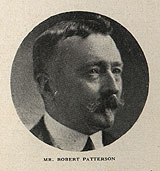| Noya | << = = | The Early Settlers of the Country Robert Patterson |
= = >> | Rivera |
 As
soon as the traveller reaches the territory he will without any doubt, hear
the name of "Don Roberto" mentioned, in this simple and hearty
fashion, for his popularity is such that years ago the inhabitants of Santa
Cruz, with the characteristic familiarity of the country, knocked off his
surname as a mark of affection, and put before his name a particle which
is synonymous with respect and consideration.
As
soon as the traveller reaches the territory he will without any doubt, hear
the name of "Don Roberto" mentioned, in this simple and hearty
fashion, for his popularity is such that years ago the inhabitants of Santa
Cruz, with the characteristic familiarity of the country, knocked off his
surname as a mark of affection, and put before his name a particle which
is synonymous with respect and consideration.
"Don Roberto" Patterson — the person in question — justifies when one knows him, the affectionate appellation of the country. Broad-shouldered, well set-up, his physique emits health and self-confidence. On his face there is ever an optimistic smile of triumph, and from his lips flows pleasant and witty talk, favouring the "agachada" and the pun, but it is in good taste. He is kind, too and free-souled and ready with his purse does one wonder then at his popularity?
Don Roberto Patterson left the Falklands in 1890 for Sandy Point, and at the beginning of the following year, he started overland for San Julian. Travelling in those days spelled real adventure. The journey had to be made on the back of a "goodly nag", across lots, and being guided over the pampas by instinct or by compass, rather by the former indeed than the latter. Besides, as there were at that time no hospitable "estancias" to offer to the traveller a bed for his tired bones, and food for his empty stomach, the nights had to be spent out of doors, in the propitious shelter of some creek, lying on the hard ground and feeding oneself on a piece of meat which hung from the saddle-hooks.
After a fortnight's journey "Don Roberto" reached San Julian, where he at once began to look for a piece of land on which to settle and start work. At fourteen leagues to the north of the port named, he found it and, in 1892, he and his brother William founded the now thriving establishment called "Mata Grande".
But "Don Roberto" was a man of vastly greater aspirations, and above all, he trusted in himself and in the future of the country in which he was working. He wished to extend his radius of action, and he accomplished it. In 1907, with his friend John Frazer and Cecil Withers, he formed the estancia "Mulak Aike", and in 1911, the so-called "Lai Aike", in partnership also with other friends of his.
At the present time, Mr. Patterson manages the establishments mentioned with all energy and activity which characterised his original pioneer work, and he endows them with all the elements which may concur in making production more fruitful. But this task does not prevent him from contributing with his name, his experience and his capital towards the development of other business interests which may redound in benefits to the zone in which he has settled.
Source: «La Patagonia Argentina», pp.152-153